Introduction
The landscape of technology is undergoing a profound transformation, driven by the innovative capabilities of Google Cloud companies. These organizations, ranging from nimble startups to established enterprises, are harnessing the power of cloud computing, machine learning, and data analytics to redefine their operational frameworks and enhance customer experiences.
As the cloud computing market is projected to reach an astonishing $864 billion by 2025, the urgency for businesses to adopt these advanced solutions becomes increasingly clear. The strategic integration of Google Cloud's services not only streamlines operations but also fosters a culture of continuous innovation, positioning companies to thrive in an ever-evolving digital environment.
However, as they navigate this complex landscape, understanding the challenges and opportunities presented by Google Cloud is essential for driving sustainable growth and maintaining a competitive edge.
Defining Google Cloud Companies and Their Importance in Technology
Organizations using the extensive array of services from the tech giant are crucial in improving their operations, fostering innovation, and attaining strategic goals. This varied group ranges from nimble startups to major corporations, all utilizing advanced technologies like computing solutions, machine learning, and data analysis to transform their operational models. The significance of these Google Cloud companies is highlighted by their ability to deploy advanced technological solutions that improve operational efficiency, elevate customer experiences, and cultivate a culture of innovation.
As the online computing market is anticipated to hit an impressive $864 billion by 2025, the necessity for companies to shift to digital platforms is clear. According to StormForge,
Most companies reported that as their expenditure on digital services increased, so did their waste, indicating that effective management of these resources is crucial.
Furthermore, data from 2024 reveals that GCP customers in the Internet sector frequently invest more, with 10.5% of these customers spending $5,000 or more each month.
This trend emphasizes the crucial role that Google Cloud companies play in enhancing organizational efficiency and innovation, making it vital for businesses to comprehend the environment of computing as they maneuver through this changing technological landscape. For instance, Drift, a prominent player in the marketing technology sector, successfully reduced its expenses by $2.4 million through strategic resource management. This situation illustrates how organizations can improve their online expenditures while enhancing operational capabilities.
Furthermore, industry specialists highlight that utilizing innovative features of the platform not only simplifies operations but also cultivates a competitive advantage in the market, underscoring the significance of cloud adoption in propelling organizational success.
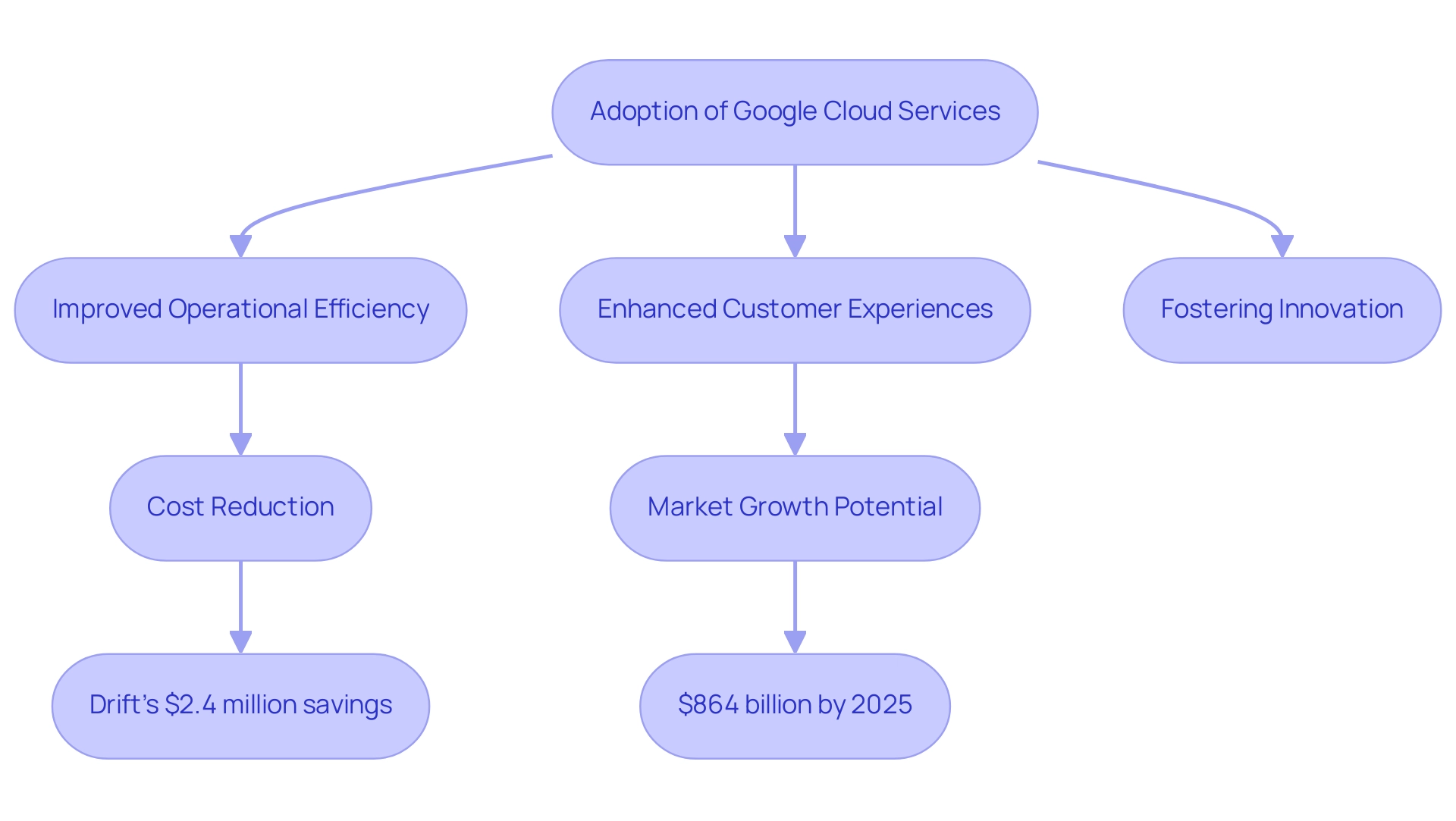
Innovations and Services: How Google Cloud Companies Drive Business Transformation
The technology giant is at the forefront of innovation, offering a wide range of services that stimulate organizational transformation. With the U.S. AI market projected to reach approximately $594 billion by 2032 and global AI chip revenue expected to reach $83.25 billion by 2027, organizations are increasingly adopting advanced AI and machine learning tools to gain competitive advantages. These tools allow organizations to analyze large volumes of data and extract actionable insights.
For instance, the Google Cloud AI Platform empowers Google Cloud companies to build and deploy sophisticated machine learning models that enhance decision-making and operational efficiency. Furthermore, the integration of BigQuery allows organizations to harness powerful data analytics capabilities, facilitating real-time processing and analysis of substantial datasets. By leveraging these innovations, organizations can streamline operations, enhance customer engagement, and quickly adapt to shifting market dynamics.
This positions them for sustainable growth in an increasingly competitive landscape. Notably, 46% of entrepreneurs expect AI to generate responses to colleagues, illustrating the practical applications of AI in professional settings. As highlighted by industry leaders, 60% of public sector IT professionals identify AI skills shortages as a significant hurdle to implementing these transformative technologies, underscoring the need for strategic investment in talent and resources.
Furthermore, the autonomous vehicle market, which produces over $170 billion in yearly revenue globally, illustrates how AI technologies are demonstrating to be a vital revenue-generating industry, further highlighting the abilities of the technology firm in supporting such innovations. Ultimately, the services provided by the platform are not merely instruments; they are vital elements of a strong plan for organizational transformation.
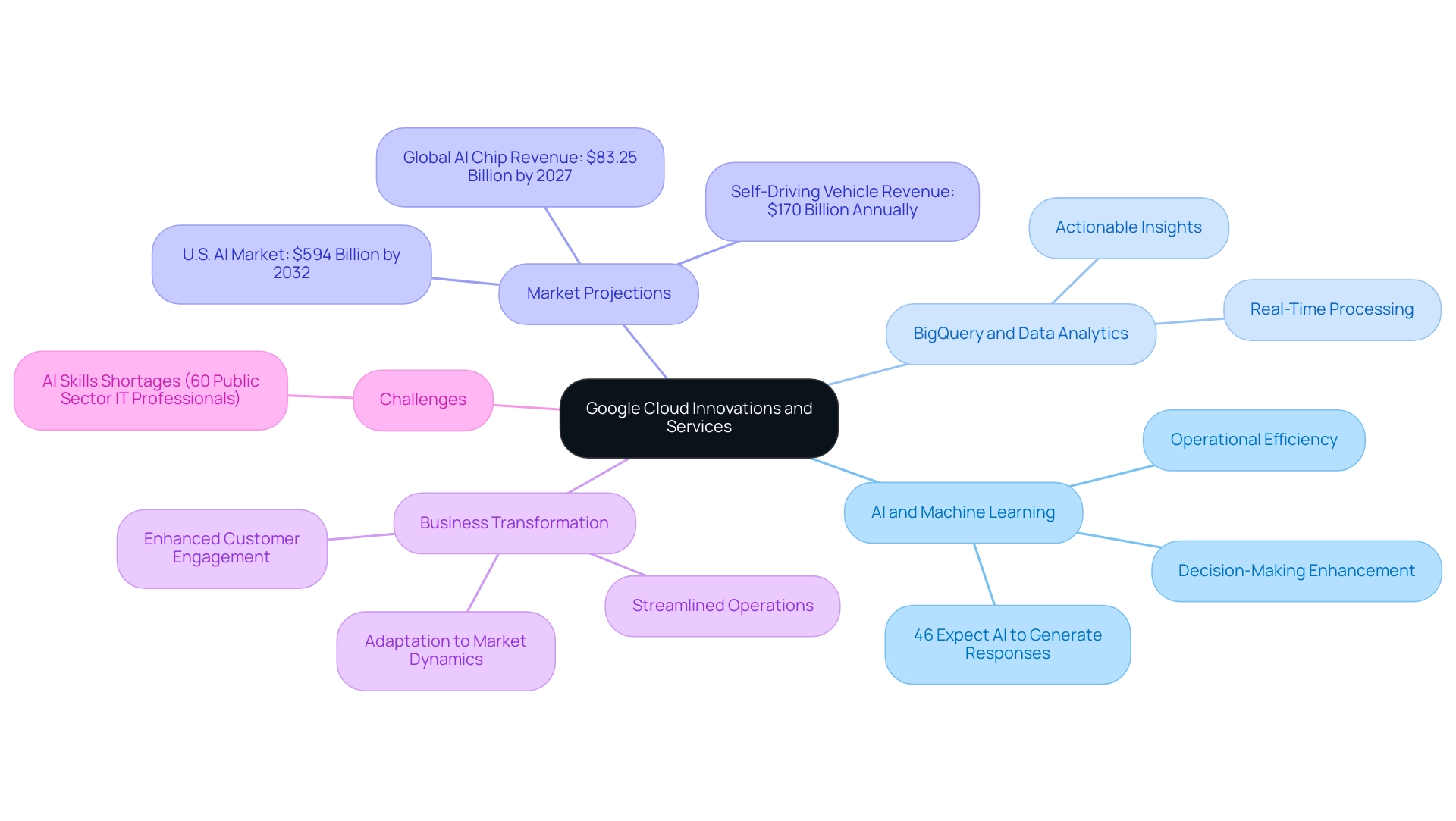
The Role of Collaboration and Partnerships in Google Cloud Ecosystem
Collaboration and partnerships are essential to the success and growth of the tech ecosystem, providing a basis for improving service offerings and fostering innovation. The tech giant has formed strategic partnerships with a wide range of organizations, including top software developers and significant industry players, to provide integrated solutions customized to particular business requirements. For instance, the partnership with Salesforce enables businesses to utilize technologies to enhance their customer relationship management capabilities.
These partnerships enable the companies to utilize their combined strengths, leading to comprehensive solutions that not only meet client needs but also advance technological limits. As Roman aptly questions, 'Will SaaS re-accelerate and will online marketplaces consolidate a large portion of SaaS expenditure in the coming years?' This highlights the importance of collaboration in shaping the future of technology.
Additionally, with Google Cloud companies holding an 11% market share compared to Alibaba Cloud's 4% as of 2023, these partnerships are crucial for maintaining a competitive advantage. The influence of such collaboration goes beyond immediate service improvements; it also propels the continuous development of online services, as evidenced by the expansion of gaming services, which is expected to increase from $2.38 billion in 2022 to $8.17 billion by 2025 due to advancements in technology. This collaborative setting promotes a culture of ongoing enhancement and innovation, ensuring that services remain at the forefront of technological advancement.
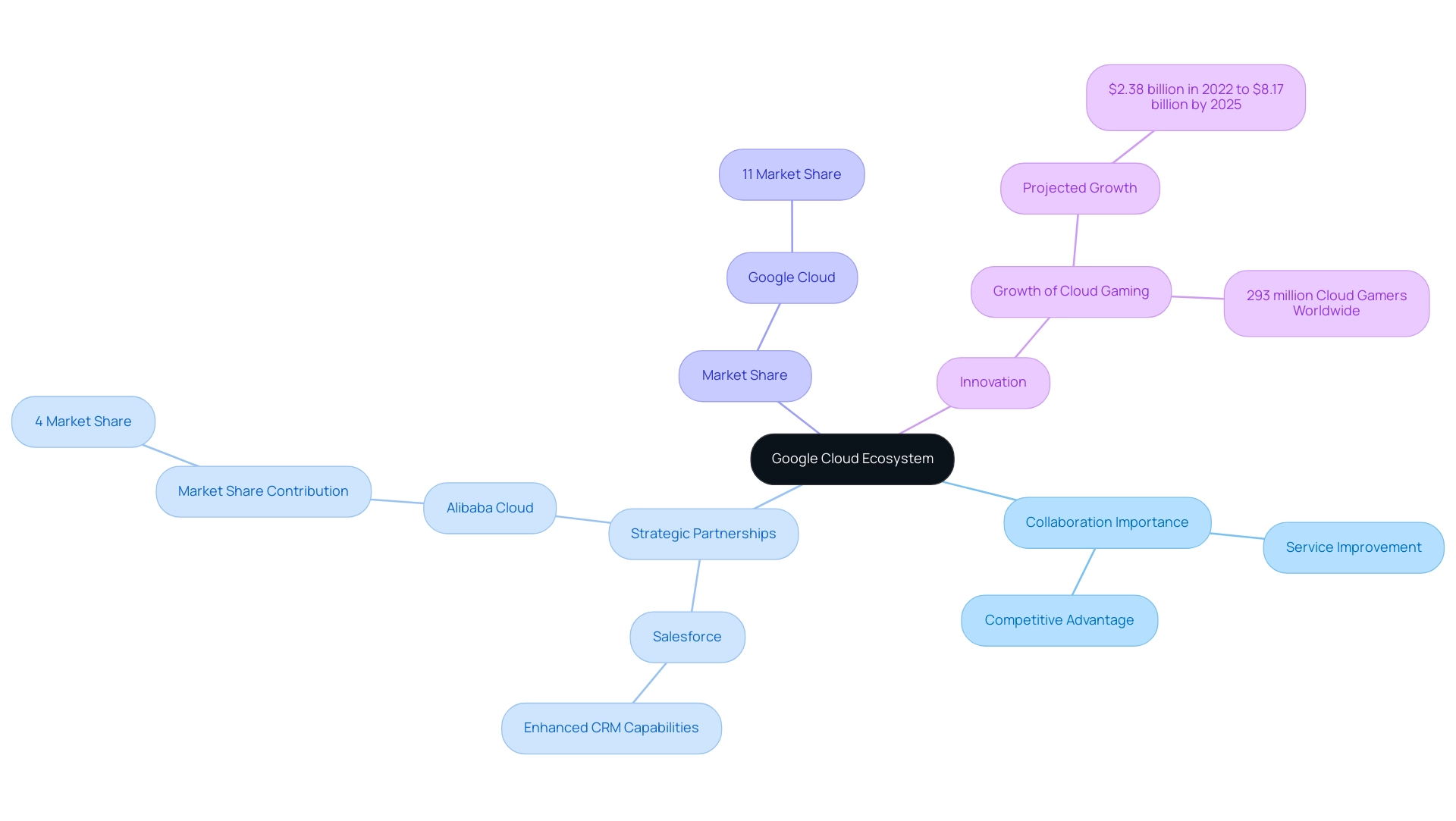
Challenges Faced by Google Cloud Companies and Their Solutions
While Google Cloud companies offer numerous advantages, organizations frequently face significant challenges in their digital transformation journey. A pressing concern is data security, with 46% of business IT leaders indicating that external actors, such as hackers, represent the greatest risk to online data. The recent incident involving Real Estate Wealth Network serves as a stark reminder of the potential repercussions of inadequate security, where over 1.5 billion records were exposed, marking one of the most significant data leaks in U.S. history.
As noted by Upguard, 'In December 2023, Real Estate Wealth Networks experienced a significant leak in US history, with more than 1.5 billion records in their database to the public.' This incident underscores the importance of robust security measures. Furthermore, the 2023 Toyota Hack illustrates how even large companies can suffer from simple misconfiguration errors, with data accessible for over eight years.
Compliance with ever-evolving regulations adds another layer of complexity, as companies must navigate a landscape of stringent requirements to avoid penalties. Additionally, integrating new technologies with legacy systems can prove daunting. To effectively address these challenges, organizations should adopt a proactive approach that includes:
- Investing in robust cybersecurity measures
- Ensuring adherence to industry standards
- Formulating a clear technology integration roadmap that incorporates Google Cloud companies
Automation is crucial for effective cloud governance and security control management, as it can help mitigate the risks highlighted by these incidents. By utilizing the advanced security features of the platform and implementing best practices, companies can improve operational resilience and prepare themselves for successful digital transformation.
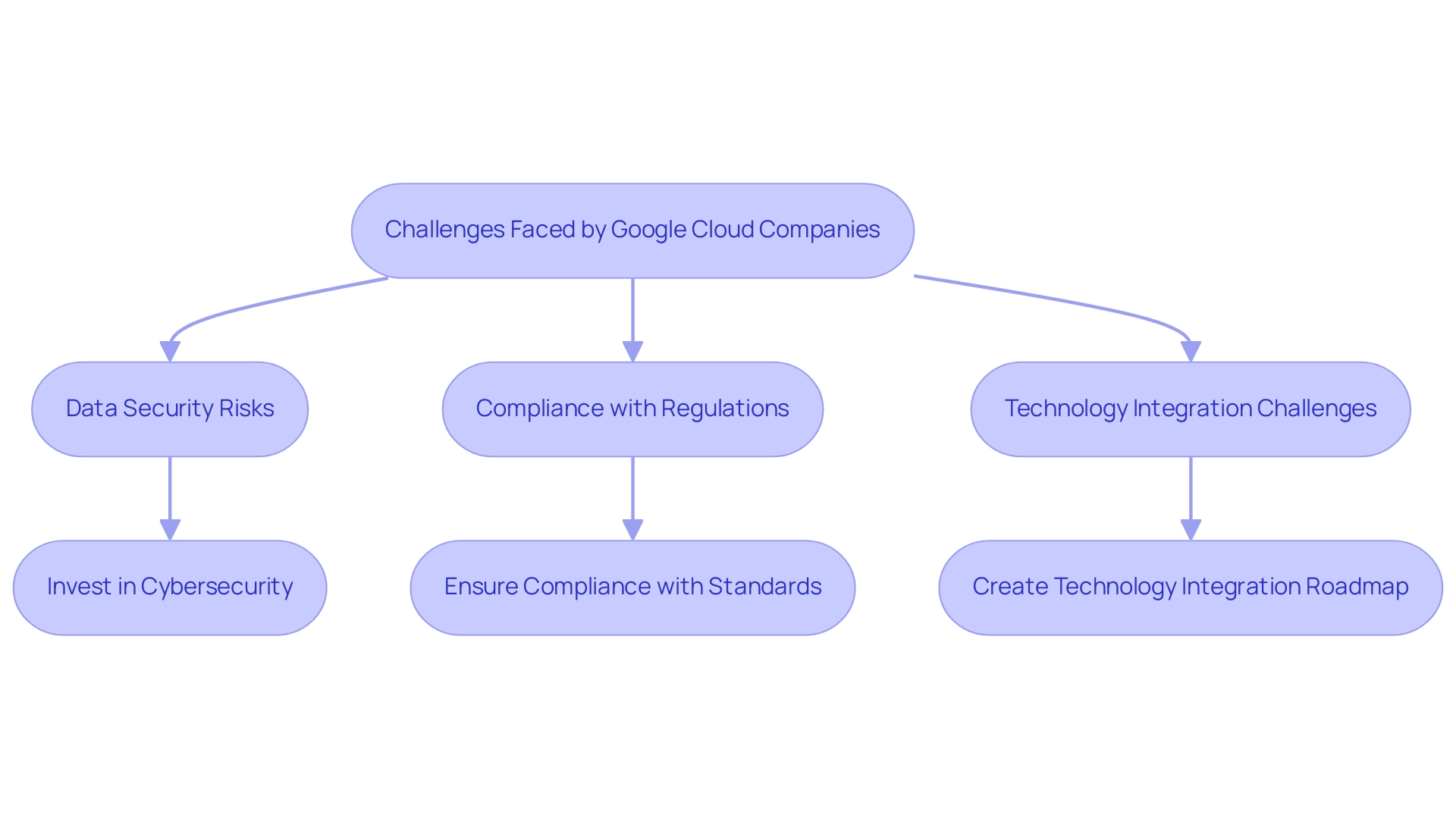
Future Trends: The Evolving Landscape of Google Cloud Companies
As the technological landscape evolves, companies utilizing Google Cloud are poised to significantly influence the future of corporate operations. A notable trend is the increased adoption of artificial intelligence and machine learning, with 92% of organizations now integrating these technologies into their structures as part of a multicloud strategy. This shift enables organizations to harness AI-driven insights that enhance decision-making and operational efficiency, reshaping industries and revolutionizing the way we work and live, as articulated by Mariusz Michalowski:
This technological approach enables entities and individuals to scale, collaborate, and innovate at unprecedented levels.
Furthermore, the rise of edge computing is set to transform how organizations process data, allowing them to analyze information closer to its source, thereby reducing latency and improving response times. Additionally, half of surveyed businesses view cloud computing as a modern data protection strategy, emphasizing its relevance in safeguarding data in today’s digital landscape. In terms of market positioning, the service holds an 11% market share, while Alibaba's platform has secured 4% as of 2023, highlighting the competitive landscape in which this company operates.
Moreover, sustainability will become increasingly significant, with companies striving to minimize their environmental impact through energy-efficient technologies and practices. By proactively embracing these trends, companies within Google Cloud can secure their competitive edge and continue to drive innovation across various sectors.
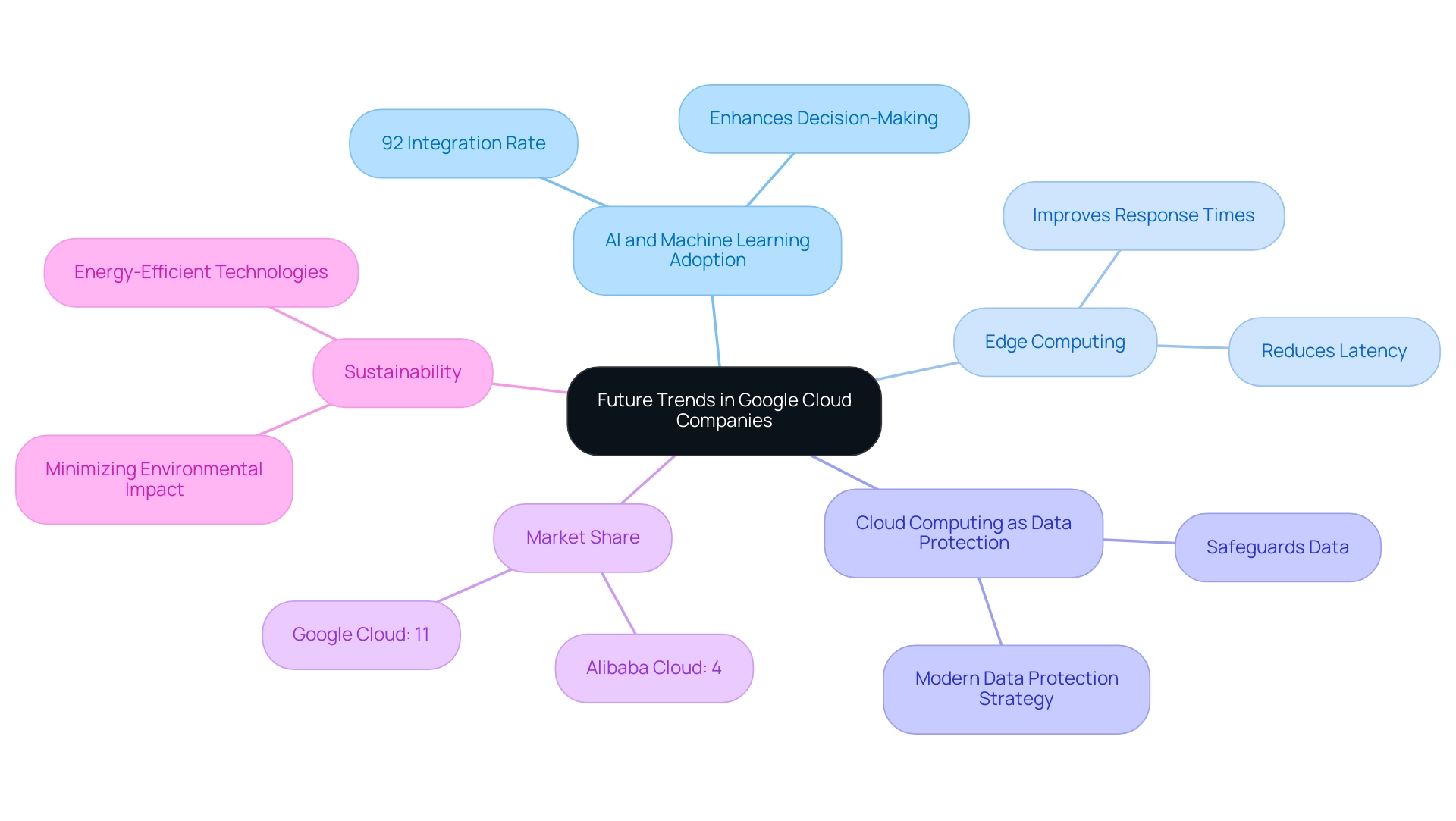
Conclusion
Google Cloud companies are significantly shaping the technology landscape by enhancing operational efficiencies and driving innovation. As the cloud computing market continues to grow, the urgency for businesses to adopt advanced solutions becomes clear. Successful organizations demonstrate the value of strategic resource management to optimize cloud spending.
With innovations in artificial intelligence and machine learning, Google Cloud empowers businesses to analyze large datasets and derive actionable insights, allowing for swift adaptation to market changes. Collaborations within the Google Cloud ecosystem further enhance service offerings and foster ongoing technological advancements.
However, organizations must address challenges such as:
- Data security
- Compliance
- Legacy system integration
to ensure effective digital transformation. A proactive approach is essential for mitigating risks and ensuring operational resilience.
Looking ahead, trends like:
- Increased AI adoption
- Edge computing
- Sustainability
will define the future of Google Cloud companies. Embracing these developments is crucial for maintaining a competitive edge in an ever-evolving digital landscape. Leveraging Google Cloud’s capabilities is not just a technological shift; it is a strategic necessity for success in the modern business environment.




